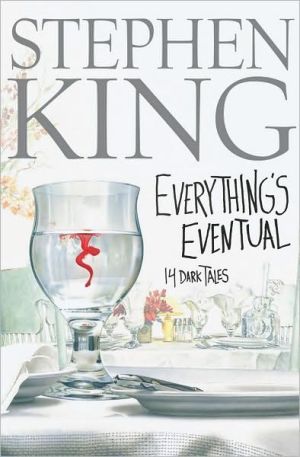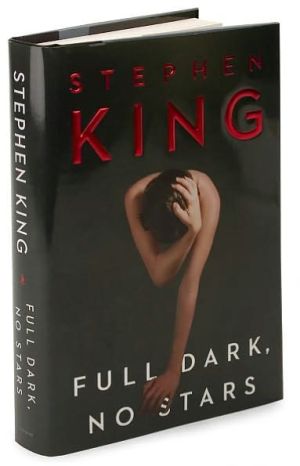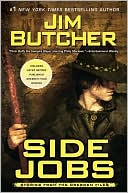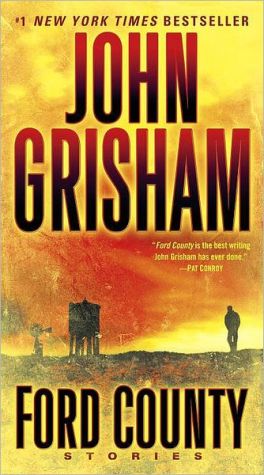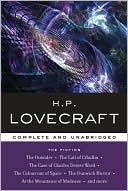Everything's Eventual
The first collection of stories Stephen King has published since Nightmares & Dreamscapes nine years ago, Everything's Eventual includes one O. Henry Prize winner, two other award winners, four stories published by The New Yorker, and "Riding the Bullet," King's original e-book, which attracted over half a million online readers and became the most famous short story of the decade.\ "Riding the Bullet," published here on paper for the first time, is the story of Alan Parker, who's...
Search in google:
From the stunningly fertile imagination of perhaps the greatest storyteller of our time, here are fourteen intense, eerie, and compelling stories, including one O. Henry Prize winner, stories from The New Yorker, and "Riding the Bullet" which, when published as an eBook, attracted over half a million online readers.Publishers WeeklyEyebrows arched in literary circles when, in 1995, the New Yorker published Stephen King's "The Man in the Black Suit," a scorchingly atmospheric tale of a boy's encounter with the Devil in backwoods Maine. The story went on to win the 1996 O. Henry Award for Best Short Story, confirming what King fans have known for years that the author is not only immensely popular but immensely talented, a modern-day counterpart to Twain, Hawthorne, Dickens. "The Man in the Black Suit" appears in this hefty collection, King's first since Nightmares and Dreamscapes (1993), along with three other extraordinary New Yorker tales: "All That You Love Will Be Carried Away," an intensely moving story of a suicidal traveling salesman who collects graffiti; "The Feeling, You Can Only Say What It Is in French," about a woman caught in a fatal loop of d j vu; and "The Death of Jack Hamilton," a gritty, witty tale of Dillinger's gang on the lam. Together, they make up what King, in one of many author asides, calls his "literary stories," which he contrasts to the "all-out screamers" though most of the stories here seem a mix of the two, with the distinction as real as a line on a map. "Autopsy Room Four," a black-humor horror about a man who wakes up paralyzed in a morgue and about to be autopsied, displays a mastery of craft, and "1408," a haunted hotel-room story that first surfaced on the audio book Blood and Smoke, engenders a sense of profound unease, of dread, as surely as do the elegant work of Blackwood or Machen or, if one prefers, Baudelaire or Sartre. King's talent doesn't always burn at peak, of course, and there are lesser tales here, too, but none that most writers wouldn't be proud to claim, like the slight but affecting "Luckey," about a poor cleaning woman given a "luckey" coin as a tip, or "L.T.'s Theory of Pets," which King cites as his favorite of the collection, but whose shift from humor to horror comes off as arbitrary, at least on the page (the story first appeared in audiobook form). Then there's "Riding the Bullet," the novella that put King on the cover of Time and rattled the publishing community not for its content a suspenseful encounter with the dead but for its mode of delivery, as an e-book, and "The Little Sisters of Eleuria," another resonant entry in King's self-proclaimed "magnus opus" about Roland the Gunslinger (Roland will return, King lets on, in a now-finished 900-page Dark Tower novel, Wolves of the Calla). Fourteen stories, most of them gems, featuring an array of literary approaches, plus an opinionated intro from King about the "(Almost) Lost Art" of the short story: this will be the biggest selling story collection of the year, and why not? No one does it better. (On sale Mar. 19) Copyright 2002 Cahners Business Information.
Chapter One\ Louis Creed, who had lost his father at three and who had never known a grandfather, never expected to find a father as he entered his middle age, but that was exactly what happened...although he called this man a friend, as a grown man must do when he finds the man who should have been his father relatively late in life. He met this man on the evening he and his wife and his two children moved into the big white frame house in Ludlow. Winston Churchill moved in with them. Church was his daughter Eileen's cat.\ The search committee at the university had moved slowly, the hunt for a house within commuting distance of the university had been hair-raising, and by the time they neared the place where he believed the house to be — all the landmarks are right...like the astrological signs the night before Caesar was assassinated, Louis thought morbidly — they were all tired and tense and on edge. Gage was cutting teeth and fussed almost ceaselessly. He would not sleep, no matter how much Rachel sang to him. She offered him the breast even though it was off his schedule. Gage knew his dining schedule as well as she — better, maybe — and he promptly bit her with his new teeth. Rachel, still not entirely sure about this move to Maine from Chicago, where she had lived her whole life, burst into tears. Eileen promptly joined her. In the back of the station wagon, Church continued to pace restlessly as he had done for the last three days it had taken them to drive here from Chicago. His yowling from the cat kennel had been bad, but his restless pacing after they finally gave up and set him free in the car had been almost as unnerving.\ Louis himself felt a little like crying. A wild but not unattractive idea suddenly came to him: He would suggest that they go back to Bangor for something to eat while they waited for the moving van, and when his three hostages to fortune got out, he would floor the accelerator and drive away without so much as a look back, foot to the mat, the wagon's huge four-barrel carburetor gobbling expensive gasoline. He would drive south, all the way to Orlando, Florida, where he would get a job at Disney World as a medic, under a new name. But before he hit the turnpike — big old 95 southbound — he would stop by the side of the road and put the fucking cat out too.\ Then they rounded a final curve, and there was the house that only he had seen up until now. He had flown out and looked at each of the seven possibles they had picked from photos once the position at the University of Maine was solidly his, and this was the one he had chosen: a big old New England colonial (but newly sided and insulated; the heating costs, while horrible enough, were not out of line in terms of consumption), three big rooms downstairs, four more up, a long shed that might be converted to more rooms later on — all of it surrounded by a luxuriant sprawl of lawn, lushly green even in this August heat.\ Beyond the house was a large field for the children to play in, and beyond the field were woods that went on damn near forever. The property abutted state lands, the realtor had explained, and there would be no development in the foreseeable future. The remains of the Micmac Indian tribe had laid claim to nearly eight thousand acres in Ludlow and in the towns east of Ludlow, and the complicated litigation, involving the federal government as well as that of the state, might stretch into the next century.\ Rachel stopped crying abruptly. She sat up. "Is that — "\ "That's it," Louis said. He felt apprehensive — no, he felt scared. In fact he felt terrified. He had mortgaged twelve years of their lives for this; it wouldn't be paid off until Eileen was seventeen.\ He swallowed.\ "What do you think?"\ "I think it's beautiful," Rachel said, and that was a huge weight off his chest — and off his mind. She wasn't kidding, he saw; it was in the way she was looking at it as they turned in the asphalted driveway that curved around to the shed in back, her eyes sweeping the blank windows, her mind already ticking away at such matters as curtains and oilcloth for the cupboards, and God knew what else.\ "Daddy?" Ellie said from the back seat. She had stopped crying as well. Even Gage had stopped fussing. Louis savored the silence.\ "What, love?"\ Her eyes, brown under the darkish blond hair in the rearview mirror, also surveyed the house, the lawn, the roof of another house off to the left in the distance, and the big field stretching up to the woods.\ "Is this home?"\ "It's going to be, honey," he said.\ "Hooray!" she shouted, almost taking his ear off. And Louis, who could sometimes become very irritated with Ellie, decided he didn't care if he ever clapped an eye on Disney World in Orlando.\ He parked in front of the shed and turned off the wagon's motor.\ The engine ticked. In the silence, which seemed very big after Chicago and the bustle of State Street and the Loop, a bird sang sweetly in the late afternoon.\ "Home," Rachel said softly, still looking at the house.\ "Home," Gage said complacently on her lap.\ Louis and Rachel stared at each other. In the rearview mirror, Eileen's eyes widened.\ "Did you — "\ "Did he — "\ "Was that — "\ They all spoke together, then all laughed together. Gage took no notice; he only continued to suck his thumb. He had been saying "Ma" for almost a month now and had taken a stab or two at something that might have been "Daaa" or only wishful thinking on Louis's part.\ But this, either by accident or imitation, had been a real word. Home.\ Louis plucked Gage from his wife's lap and hugged him.\ That was how they came to Ludlow.\ Copyright © 1983 by Stephen King
Introduction: Practicing the (Almost) Lost Art 11Autopsy Room Four 19The Man in the Black Suit 45All That You Love Will Be Carried Away 71The Death of Jack Hamilton 87In the Deathroom 119The Little Sisters of Eluria 145Everything's Eventual 211L.T.'s Theory of Pets 265The Road Virus Heads North 287Lunch at the Gotham Cafe 313That Feeling, You Can Only Say What It Is in French 3471408 365Riding the Bullet 405Luckey Quarter 447
\ Publishers WeeklyEyebrows arched in literary circles when, in 1995, the New Yorker published Stephen King's "The Man in the Black Suit," a scorchingly atmospheric tale of a boy's encounter with the Devil in backwoods Maine. The story went on to win the 1996 O. Henry Award for Best Short Story, confirming what King fans have known for years that the author is not only immensely popular but immensely talented, a modern-day counterpart to Twain, Hawthorne, Dickens. "The Man in the Black Suit" appears in this hefty collection, King's first since Nightmares and Dreamscapes (1993), along with three other extraordinary New Yorker tales: "All That You Love Will Be Carried Away," an intensely moving story of a suicidal traveling salesman who collects graffiti; "The Feeling, You Can Only Say What It Is in French," about a woman caught in a fatal loop of d j vu; and "The Death of Jack Hamilton," a gritty, witty tale of Dillinger's gang on the lam. Together, they make up what King, in one of many author asides, calls his "literary stories," which he contrasts to the "all-out screamers" though most of the stories here seem a mix of the two, with the distinction as real as a line on a map. "Autopsy Room Four," a black-humor horror about a man who wakes up paralyzed in a morgue and about to be autopsied, displays a mastery of craft, and "1408," a haunted hotel-room story that first surfaced on the audio book Blood and Smoke, engenders a sense of profound unease, of dread, as surely as do the elegant work of Blackwood or Machen or, if one prefers, Baudelaire or Sartre. King's talent doesn't always burn at peak, of course, and there are lesser tales here, too, but none that most writers wouldn't be proud to claim, like the slight but affecting "Luckey," about a poor cleaning woman given a "luckey" coin as a tip, or "L.T.'s Theory of Pets," which King cites as his favorite of the collection, but whose shift from humor to horror comes off as arbitrary, at least on the page (the story first appeared in audiobook form). Then there's "Riding the Bullet," the novella that put King on the cover of Time and rattled the publishing community not for its content a suspenseful encounter with the dead but for its mode of delivery, as an e-book, and "The Little Sisters of Eleuria," another resonant entry in King's self-proclaimed "magnus opus" about Roland the Gunslinger (Roland will return, King lets on, in a now-finished 900-page Dark Tower novel, Wolves of the Calla). Fourteen stories, most of them gems, featuring an array of literary approaches, plus an opinionated intro from King about the "(Almost) Lost Art" of the short story: this will be the biggest selling story collection of the year, and why not? No one does it better. (On sale Mar. 19) Copyright 2002 Cahners Business Information.\ \ \ \ \ The New York Times"Unpredictable.... Full of surprises."\ \ \ \ The Washington Post"Well-crafted, nuanced stories."\ \ \ \ \ \ USA Today"Compelling.... Brilliantly creepy."\ \ \ \ \ \ Library JournalKing's fourth collection of short stories (following Night Shift, Skeleton Crew, and Nightmares and Dreamscapes) offers readers 14 tales that include the much-touted Internet-download phenomenon, "Riding the Bullet"; "The Little Sisters of Eluria," a Dark Tower prequel; the novella-length title story; and "L.T's Theory of Pets," King's personal favorite within the group, which was previously available only in audio. Not only do the action-based plots and engaging narratives hold up well within the realm of King's work, but tales like the 1996 O. Henry Award-winning Nathaniel Hawthorne homage, "The Man in the Black Suit," show us King at his literary best. An added bonus for fans is King's story-by-story annotation, in which he chronicles the event, thought, or image that served as his creative impetus. This is a milestone in compilations of King's shorter works. Recommended for all popular fiction collections. Nancy McNicol, Whitneyville Branch Lib., Hamden, CT Copyright 2002 Cahners Business Information.\ \ \ \ \ Kirkus ReviewsThese days, grumbles King (Hearts in Atlantis), "When you get done, you get done . . . I don't want to finish up like Harold Robbins." (Robbins wrote into his 80s despite aphasia from a stroke and kept publishing despite being dead.) Here, King gathers previously uncollected tales from sources that show his desire to stay fresh by diving into new waters: three pieces have never seen paper—having been electronic, part of a game, or for audio—and four are more polished pieces that ran first in The New Yorker. The title story is from a game called F13 (don't ask us) and tells of social outcast Dink Earnshaw, who uses symbols and personal words to lead others to suicide. A Mr. Sharpton from Transcorp gets Dink to join his company and write letters that deservedly kill evil people, although Dink must consequently live a constricted life bound by odd rules. (One day, he figures that he's killed over 200 people, and, hey, not all of them evil.) "Riding the Bullet," which made publishing history as an e-book and audio book, tells about Alan Parker hitchhiking from the University of Maine to see his hospitalized mother and getting a ride with George Staub, two years dead, whose grave Alan has seen (facing death—this is a "bullet" we all must ride). In "All That You Love Will Be Carried Away," Alfie Zimmer, a Gourmet Foods salesman, decides against suicide (for now) and thus saves his large collection of graffiti notes gathered while on the road. In the Poe-esque "In the Deathroom," an imprisoned New York Times reporter being tortured in some nameless South American version of hell faces death as certain as that faced under the Inquisitors of Toledo in the "The Pit and the Pendulum." Exceptthat. . . . Less stylish than The Green Mile (or than Poe), though King remains strong in the short form.\ \
